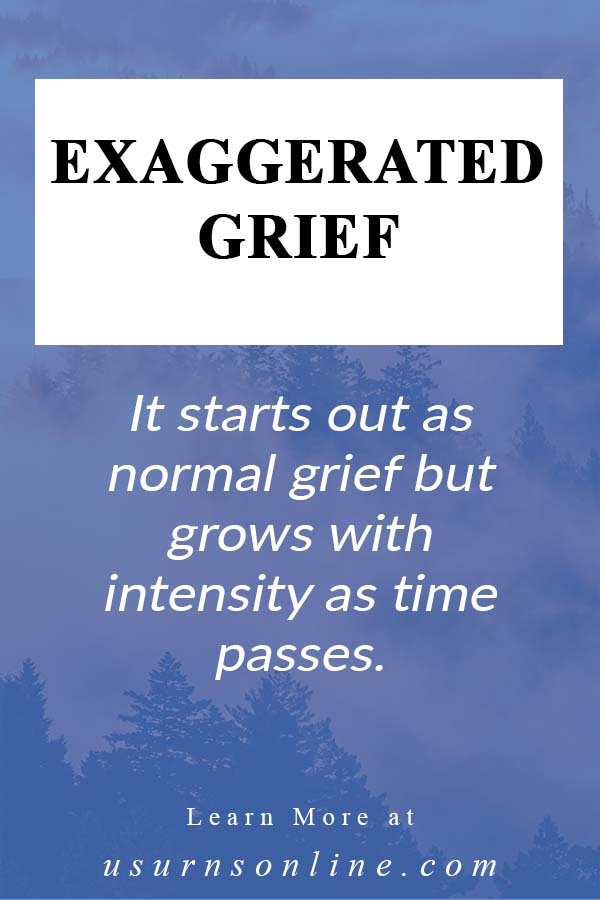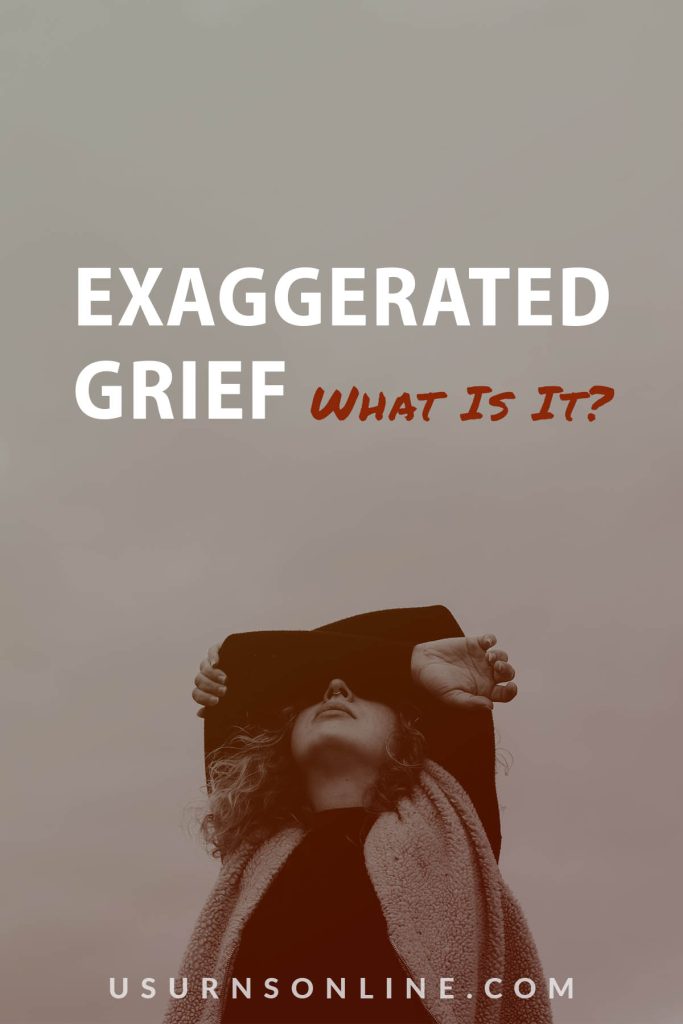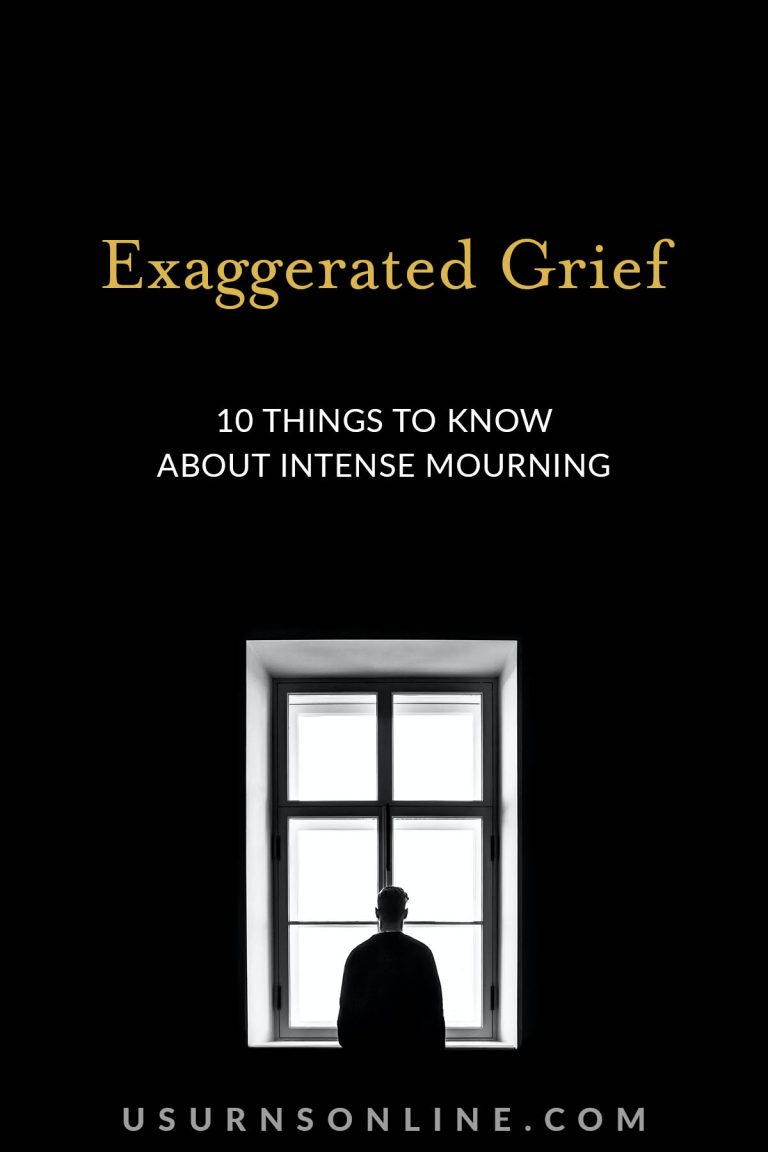Today we’re going to talk about exaggerated grief. What is it? Are there specific symptoms or warning signs? What do you need to know about it?
Grief is a global emotion. Everyone will suffer from it, but it affects everyone differently. Sadness, anxiety, and feelings of loneliness are all part of grief.
But how do you know if it is more than “normal” grief? How do you know when your feelings are out of control and exaggerated grief has set in?
Exaggerated grief is a type of grief that falls under the umbrella of complicated grief. About 7% of grieving people will suffer complicated grief of some form, and this is one of those types. Let’s learn about it.
What Is Exaggerated Grief?
Exaggerated grief is the escalation of normal grief responses. This escalation tends to worsen as time moves on, making life more difficult and grief more overwhelming.
The typical grieving process involves intense emotions that peak at about 3-6 months then slowly subdue over time as the mourner comes to acceptance. Sometimes, however, the peak becomes a plateau. The grieving person has that “really rough patch” that most people experience at 3-6 months, but it just keeps going and can even get more intense.

Related: How Long Does Grief Last? (A Grief Timeline)
What are the symptoms of exaggerated grief?
Symptoms can include:
- Trouble concentrating on tasks
- Nightmares
- Insomnia
- Wishing you had died instead of your loved one
- Feeling life isn’t worth living anymore
- Intense emotional pain
- Failure to accept the death
- Bitterness and anger
Most mourners experience some of these things briefly. The trouble is when your grief is defined by these heightened symptoms. Seek professional help if you have continual intense grief and are having problems recovering after losing your loved one.
What causes exaggerated grief?
Exaggerated grief makes you feel overwhelmed by the death of your loved one. Normal grief feelings become magnified and can develop into phobias.
Urns Made in the USA
When a person suffers more than one loss or traumatic event on top of each other, they may develop exaggerated grief. This is a result of not having enough time to recover from one event before another one occurs.
A person experiencing exaggerated grief may feel out of control and unable to cope with the losses they have experienced. The longer exaggerated grief goes untreated, the worse the symptoms may become. Chronic depression will probably set in.
How is exaggerated grief different from normal grief?
While you are working through normal grief, you can push through and recover from your sorrow. You’ll have bad days, but you can get through them. Yes, you grieve, but your grief can be handled on a day-to-day basis.
Exaggerated grief is a form of complicated grief. Your feelings are intensified or exaggerated. The feelings you are trying to cope with will worsen. Your sorrow and inability to function do not improve over time. This is a type of grief that needs professional help.
10 Things to Know About Exaggerated Grief
Grief is experienced individually. It is as unique as each person going through it. Yet, some symptoms are similar in each type of grief.
Grief can last a long time. Exaggerated grief can last a long time too, just more intensely.
1. Exaggerated grief occurs more often in women.
The risks of developing exaggerated grief go up with age. Exaggerated grief may be brought on more quickly with the death of a child or spouse’s death.
2. Past medical history can increase your risk of exaggerated grief.
Having a history of PTSD, depression, or anxiety may indicate a higher risk factor for exaggerated grief.
Getting help as soon as possible after the death of a loved one may help you. Seeking professional guidance will help to share the burden of your loss.
3. Grief is not limited to death.
Grieving over anything may become exaggerated grief. The loss of a job, promotion, or even a move to a different state can cause grief.
Imagine moving away from your home and family in a new state. You’ve left behind everything. You may feel isolated and alone, dwelling on the friends you’ve left behind. You may feel excited at the new opportunity but sad at the same time.
Letting this grief and confusion fester can lead to exaggerated grief.
4. Grief is both physical and emotional.
Grief affects your body physically and emotionally. Those headaches, upset stomachs, and aching muscles can be a side effect of your grief. Physical pain during grieving is just as “real” as emotional pain. It would be best if you didn’t ignore your body’s symptoms.
Grief can cause serious health problems; heart attacks, high blood pressure, and an increase in inflammation – causing joint and muscle pains. Stress links the emotional and physical sides of grief together. All of these things are the also true of exaggerated grief.
5. Depression may be a symptom of exaggerated grief.
Sadness is a normal part of grieving; depression is not. In normal grieving, sadness comes in waves. You will have a respite between the sad episodes.
Depression can be developed if you are going through exaggerated grief. The low feeling that never goes away. You may struggle with feelings of guilt and worthlessness. These feelings will not dissipate with time. If this is happening to you, it is essential to seek professional help.
6. Reflection can be positive or negative.
On the one hand, it is good to think through what has happened. This is a form of truth-telling, which leads to acceptance (the final stage of healthy grief). But on the other hand, too much meditation on death can lead you away from healing.
Negative thinking on the death of a loved one will only cause harm to yourself. You can’t go back and change what happened. Psychologists conjecture that thinking this way is less threatening than facing the truths you want to avoid.
Efforts to avoid the reality of your loss can cause both physical and mental health problems. It would be best if you could face the realities of your situation.
One healthy method of positive reflection is through grief journaling, which many counselors recommend (we do, too!).
7. Feelings of hopelessness can be exaggerated, too.
People dealing with exaggerated grief may have feelings of self-harm and suicide. If you were sensitive to these feelings before your grief journey began, it is important to seek help. If you’re thinking about suicide, talk to someone you trust. Don’t let these feelings overtake you.
Call the National Suicide Prevention Lifeline at 800-273-TALK (800-273-8255) to reach a trained counselor 24 hours a day.
8. Talking helps.
Talking to friends and family can help alleviate pain. Concentrating on the “positive” instead of the “negative” may help you deal with feelings of hopelessness. Hold onto the good things you experienced with your loved one. Try to let go of the “not so good.”
Take time to speak about your loved one. Join a bereavement group from your church, join a group of friends for coffee, or make an appointment with a grief counselor.
It is important to work out your feelings. You will feel better, and eventually, you will find your hope again. Finding support can be key to getting through your grief.
9. Take care of yourself.
Any ailments you may have suffered from before this grief assaulted you may get worse. Go to your doctor and get a thorough physical exam. Find out where you stand, health-wise. Let your doctor know everything you have been going through. Hold nothing back.
Follow your doctor’s advice. Get your rest and exercise in. Take care of yourself so you can be around for your family.
Here are 44 tips for healthy self-care while grieving.
10. Recovering
The good news is that you will recover. The American Cancer Society offers some helpful tips.
- Let yourself feel the pain and all the other emotions, too.
- Be patient with the process.
- Acknowledge your feelings, even the ones you don’t like.
- Get support.
- Try to maintain your normal lifestyle.
- Take care of yourself. Eat well and exercise. Physical activity is a good way to release tension.
- Avoid drinking too much alcohol or using other drugs.
- Forgive yourself for all the things you did or didn’t say or do.
- Give yourself a break from grief. You must work through it, but you don’t need to focus on grief all the time.
- Prepare for holidays, birthdays, and anniversaries knowing that strong feelings may come back.
Be creative. Start a journal, make a scrapbook, or even involve yourself in an activity that your loved one enjoyed.
More Types of Grief
Exaggerated grief isn’t the only kind of grief recognized by professionals. There are plenty of additional ways people grieve, including complicated, traumatic, anticipatory, disenfranchised grief, and many more.
Learn about each different type of grief here.





